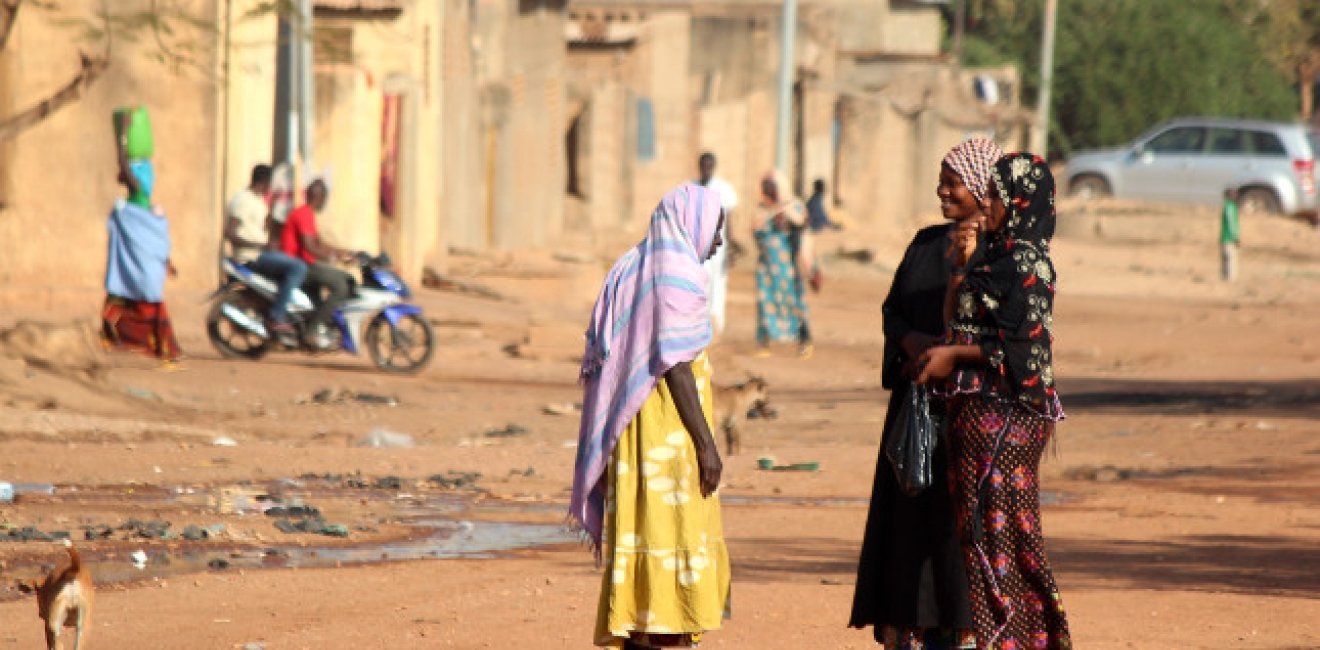
A blog of the Africa Program
This blog was originally posted on NewSecurityBeat, a blog of the Environmental Change and Security Program at the Wilson Center.
Thirty-four years ago, Burkina Faso's president, Thomas Sankara, was murdered. Only now are his alleged assassins on trial. Had he survived, the arid, landlocked country of more than 20 million people might well have taken a far different path to development.
Sankara — a charismatic reformer and a Marxist authoritarian (often referred to as Africa's Che Guevara) gave Burkina Faso its name, meaning "land of honest people" in the majority Mooré language. He rose to power at the age of 33 in a coup led by junior army officers in 1983. Once in control, he set in motion efforts to dramatically reconfigure social and economic relations in his country's conservative society. He aimed to eliminate the state's foreign debt, to attain food self-sufficiency, and to curtail the influence of the French, the International Monetary Fund, and the World Bank.
Recent reports covering the ongoing murder trial have been quick to recall Sankara's popular efforts to improve literacy, to vaccinate children, to undermine the power of wealthy ethnic and village elites, to redistribute farmland to the poor and increase agricultural production, to counter desertification, and to curtail the bureaucracy's salaries and perks.
Oddly, more media attention has focused on his modest salary and lifestyle, than the most audacious and forward-thinking of his reforms: his pro-women policies and programs. Sankara encouraged girls to finish secondary school and earn income, introduced voluntary family planning programs, and required schools to allow pregnant students to return to finish their education. Long before African leaders paid attention to women's rights, Sankara's government outlawed female genital cutting, forced marriages, and polygamy. Sankara also appointed women to cabinet positions and other top government posts, and mandated women's participation in village governing committees. His was the first among African governments to recruit women into the military.
A Polarizing Figure
Sankara's revolution ended badly. His regime was toppled by a coup on October 15, 1987 — this time led by Blaise Compaoré, once Sankara's closest friend and loyal cabinet member (now a co-defendant, in absentia, in the murder trial). Some journalists see the coup d'état as the bloody end of a personal feud. Others believe that, besides Compaoré's support from powerful conservatives in Burkinabé society, the coup was backed by Côte d'Ivoire, and perhaps by France.
While a heroic figure among the African diaspora and an inspiration to many Africans today, as the self-installed president of Burkina Faso, Sankara was a polarizing political figure. He could be ruthlessly intolerant of his opponents, some of whom he imprisoned without trial. To extend his revolution across the countryside, Sankara delegated authority to local Committees for the Defense of the Revolution (CDRs). The CDRs not only mobilized young Burkinabé and upended the traditional hierarchal social order, like Mao's Red Guards, some committed widespread abuses that locally discredited the central regime.
After seizing the reins of power, Compaoré rescinded Sankara's initiatives, including his regime's most progressive social reforms. Compaoré held onto the presidency for more than two decades, until he was deposed by opposition demonstrators in 2014.
An Alternative Future
Yet, demographers still wonder what might have happened had Sankara controlled his authoritarian excesses and his reforms gained traction. His regime's pro-woman policies might have triggered a 35-year decline in fertility that would have reconfigured Burkina Faso's pyramidal population profile (Fig. 1a) into something similar to Bangladesh's current distribution (Fig. 1b). Rather than today's 3.8 percent annual rate of growth in its prime working age workforce (from ages 20 to 54 years), Burkina Faso might now be experiencing a more manageable workforce growth rate — closer to Bangladesh's 1.6 percent per year. Were that the case, it could be experiencing the economic turnaround currently enjoyed by Bangladesh.
Instead, Burkina Faso remains in the World Bank's low-income category alongside its inland Sahelian neighbors: Mali, Niger, and Chad. According to UN Population Division estimates, the country's total fertility rate (the number of children that women are expected to bear, on average, over their lifetime) is near five children per woman, and childhood mortality ranges close to 80 deaths per 1,000 live births (in Western Europe, childhood mortality averages about 4 per 1,000). Meanwhile, the World Health Organization estimates that about one-quarter of Burkina Faso's children, under age five, show indications of malnutrition-related stunting. Recent estimates published by the UN Development Programme indicate that less than one-third of the Burkina Faso's eligible adolescents are currently enrolled in secondary school.
Over the past decade, a complex and rapidly growing insurgency involving jihadist militants, local militias, and Burkina Faso's security sector has spawned an escalating humanitarian crisis. By August 2021, the UN High Commissioner for Refugees (UNHCR) estimated that more than 1.4 million Burkinabé were internally displaced, and nearly 1.0 million of the country's residents were receiving food assistance from the World Food Programme.
While we will never know if Sankara's efforts would have ultimately jump-started Burkina Faso's economy, we do know that his initiatives appear similar to a package of pro-women reforms that were launched more than two decades earlier in Tunisia — about 3,800 kilometers to the north — by another authoritarian, Habib Bourguiba. Those reforms proved successful.
Figure 1. Population age structures of Burkina Faso, Bangladesh, and Tunisia, (1980, 2000, and 2020).
Bourguiba's Tunisia
Influenced by Turkey's nationalist founder, Kemal Atatürk, Habib Bourguiba set Tunisia on a path toward becoming a modern secular state, a goal that he believed required the full participation of Tunisia's women. During the late1950s and '60s, Bourguiba's Néo-Destour political party legislated a package of personal status laws that compelled parents to send their daughters to school, raised the legal age of marriage, prohibited polygamy and forced marriage, outlawed the veil, gave women full inheritance rights, and made divorce a secular judicial process that either spouse could initiate. Bourguiba's government established a decentralized network of family planning services, subsidized contraception, and guaranteed women the right to work outside the home.
Despite the virtually uncontested authority over national and local politics that Bourguiba wielded at the time, the Néo-Destour Party's pro-women reforms initially generated stiff opposition from religious conservatives and triggered local demonstrations. The regime reacted by jailing Islamist leaders and other citizens who openly defied these new laws and participated in rioting.
To head off an impending episode of authoritarian over-reach, in November of 1987 (nearly a month after Sankara's assassination) the upper-echelons of Néo-Destour replaced the aging Bourguiba with his prime minister, former-army general Zine al-Abidine Ben Ali. Ben Ali maintained Bourguiba's social policies until he, himself, was forced to retire in late-2010 during Tunisia's pro-democracy "Dignity Revolution". By then, the country's total fertility rate had already settled near the two-child level (Fig. 2), and its formerly youthful population profile had matured (Fig. 1c). By the time of the revolution, Tunisian levels of educational attainment and child survival were above those of its North African and Sahelian neighbors.
Figure 2. Comparisons of estimated fertility trends in Burkina Faso (BFA), Bangladesh (BGD), and Tunisia (TUN), from 1970–75 to 2015–20.
Sankara's African Perspective
Interestingly, it was in the non-European world that a handful of national political leaders first noted the relationship between women's social and economic mobility, the small family norm, and the development of modern states with functional institutions and vibrant economies. Thomas Sankara was one of them. Sankara believed that transitioning to a small family norm would ultimately free sub-Saharan Africa's states from their chronic dependency on IMF loans, food aid, and foreign military intervention. To a growing number of African development experts who are aware of the constraints that youthful age structures place on social and economic development, it appears that he was right.
This essay is the first in a series drawn from What Future for the Western Sahel? The Region's Demography and Its Implications (R. Cincotta and S. Smith, The Atlantic Council, 2021).
Richard Cincotta is a Wilson Center Global Fellow and a fellow at the Population Institute.
Sources: AP News, Atlantic Council, BBC, Review of African Political Economy, The Journal of Modern African Studies, UN High Commissioner for Refugees, "Women's Liberation and the African Freedom Struggle" by Thomas Sankara.
Photo Credit: Ouagadougou morning, courtesy of Carsten ten Brink, flickr.com.
Author


Africa Program
The Africa Program works to address the most critical issues facing Africa and US-Africa relations, build mutually beneficial US-Africa relations, and enhance knowledge and understanding about Africa in the United States. The Program achieves its mission through in-depth research and analyses, public discussion, working groups, and briefings that bring together policymakers, practitioners, and subject matter experts to analyze and offer practical options for tackling key challenges in Africa and in US-Africa relations. Read more

Explore More in Africa Up Close
Browse Africa Up Close
The Innovative Landscape of African Sovereign Wealth Funds



